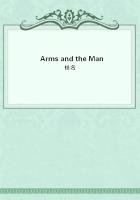`To ask you,' continued she, `to get me a rose for Mrs. Huntingdon.'
He departed. `Mrs. Huntingdon,' she exclaimed, turning to me and still holding me fast by the hand, `I'm quite shocked at you--you're just as angry, and distant, and cold as he is: and I'm determined you shall be as good friends as ever, before you go.
`Esther, how can you be so rude!' cried Mrs. Hargrave, who was seated gravely knitting in her easy chair. `Surely, you never will learn to conduct yourself like a lady!'
`Well mamma, you said, yourself--' But the young lady was silenced by the uplifted finger of her mamma, accompanied with a very stern shake of the head.
`Isn't she cross?' whispered she to me; but, before I could add my share of reproof, Mr. Hargrave reappeared at the window with a beautiful moss rose in his hand.
`Here, Esther, I've brought you the rose,' said he, extending it towards her.
`Give it her yourself, you blockhead!' cried she, recoiling with a spring from between us.
`Mrs. Huntingdon would rather receive it from you,' replied he in a very serious tone, but lowering his voice that his mother might not hear. His sister took the rose and gave it to me.
`My brother's compliments, Mrs. Huntingdon, and he hopes you and he will come to a better understanding by and by.--Will that do, Walter?' added the saucy girl, turning to him and putting her arm round his neck, as he stood leaning upon the sill of the window--'or should I have said that you are sorry you were so touchy? or that you hope she will pardon your offence?'
`You silly girl! you don't know what you are talking about,' replied he gravely.
`Indeed I don't; for I'm quite in the dark.'
`Now Esther,' interposed Mrs. Hargrave, who, if equally benighted on the subject of our estrangement, saw at least that her daughter was behaving very improperly, `I must insist upon your leaving the room!'
`Pray don't, Mrs. Hargrave, for I'm going to leave it myself,' said I, and immediately made my adieux.
About a week after, Mr. Hargrave brought his sister to see me.
He conducted himself, at first, with his usual cold, distant, half-stately, half-melancholy, altogether injured air; but Esther made no remark upon it this time; she had evidently been schooled into better manners. She talked to me, and laughed and romped with little Arthur, her loved and loving playmate. He, somewhat to my discomfort, enticed her from the room to have a run in the hall; and, thence, into the garden. I got up to stir the fire. Mr. Hargrave asked if I felt cold, and shut the doors very unseasonable piece of officiousness, for I had meditated following the noisy playfellows, if they did not speedily return. He then took the liberty of walking up to the fire himself, and asking me if I were aware that Mr. Huntingdon was now at the seat of Lord Lowborough, and likely to continue there some time.
`No; but it's no matter,' I answered carelessly; and if my cheek glowed like fire, it was rather at the question than the information it conveyed.
`You don't object to it?' he said.
`Not at all, if Lord Lowborough likes his company.'
`You have no love left for him, then?'
`Not the least.'
`I knew that--knew you were too high-minded and pure in your own nature to continue to regard one so utterly false and polluted, with any feelings but those of indignation and scornful abhorrence!'
`Is he not your friend?' said I, turning my eyes from the fire to his face, with perhaps a slight touch of those feelings he assigned to another.
`He was,' replied he, with the same calm gravity as before, `but do not wrong me by supposing that I could continue my friendship and esteem to a man who could so infamously--so impiously forsake and injure one so transcendently--well, I won't speak of it. But tell me, do you never think of revenge?'
`Revenge! No--what good would that do?--it would make him no better, and me no happier.'
`I don't know how to talk to you, Mrs. Huntingdon,' said he smiling;
`you are only half a woman--your nature must be half human, half angelic.
Such goodness overawes me; I don't know what to make of it.'
`Then sir, I fear you must be very much worse than you should be, if I, a mere ordinary mortal, am by your own confession, so vastly your superior;--and since there exists so little sympathy between us, I think we had better each look out for some more congenial companion.' And forthwith moving to the window, I began to look out for my little son and his gay young friend.
`No, I am the ordinary mortal, I maintain,' replied Mr. Hargrave.
I will not allow myself to be worse than my fellows; but you Madam--I equally maintain there is nobody like you. But are you happy?' he asked in a serious tone.
`As happy as some others, I suppose.'
`Are you as happy as you desire to be?'
`No one is so blest as that comes to, on this side eternity.'
`One thing I know,' returned he, with a deep, sad sigh; `you are immeasurably happier than I am.'
`I am very sorry for you, then,' I could not help replying.
`Are you indeed ?--No--for if you were, you would be glad to relieve me.'
`And so I should, if I could do so, without injuring myself or any other.'
`And can you suppose that I should wish you to injure yourself?--No; on the contrary, it is your own happiness I long for more than mine. You are miserable now, Mrs. Huntingdon,' continued he, looking me boldly in the face. `You do not complain, but I send feel--and know that you are miserable and must remain so, as long as you keep those walls of impenetrable ice about your still warm and palpitating heart;-- and I am miserable too.
Deign to smile on me, and I am happy: trust me, and you shall be happy also, for if you are a woman, I can make you sound I will do it in spite of yourself!' he muttered between his teeth, `and as for others, the question is between ourselves alone: you cannot injure your husband, you know; and no one else has any concern in the matter.'
`I have a son, Mr. Hargrave, and you have a mother,' said I, retiring from the window, whither he had followed me.















